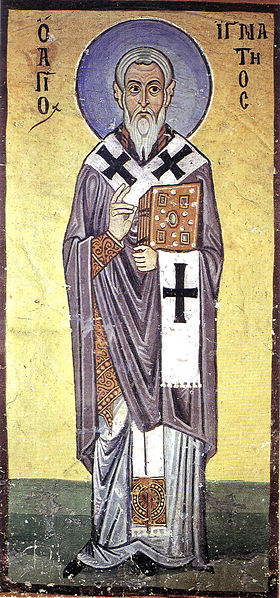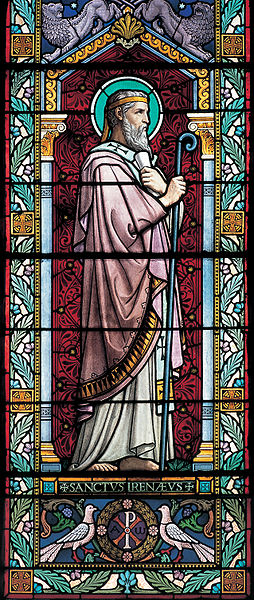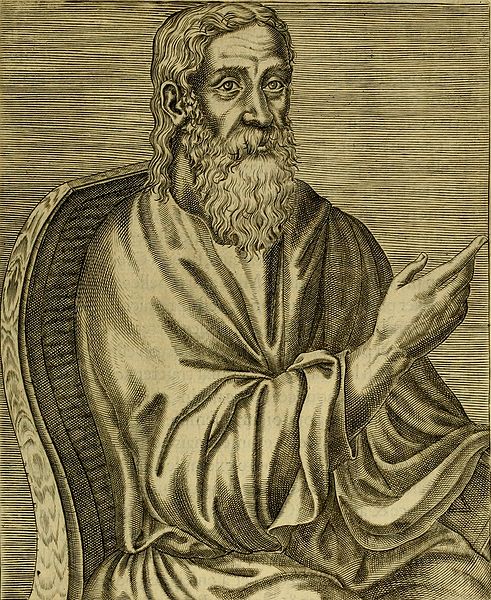Below, translated excerpts from the first volume of Karlheinz
Deschner’s Kriminalgeschichte des Christentums
(“Criminal History of Christianity”)
For centuries the crying against the heretics spread; not an objective polemic, but the demagogic of denigration. ‘In these circles to vilify was considered more important than a refutation’ (Walter Bauer). We can verify it in paleo-Christian literature.
The ‘beasts with a human figure’ of the second century (Ignatius, Irenaeus, Clement of Alexandria)
In the first Clementine Epistle, written about the year 96 C.E. (and attributed to the supposed third successor of Peter), the oldest document in patristics, he attacks the leaders of the Corinthian opposition who wanted to turn to the East, abandoning the West, and calls them ‘heated and reckless individuals’, ‘leaders of contention and disagreement’, who ‘tear apart the members of Christ as they eat and drink, and become fat, shameless, vain and braggart, hypocrites and fools’, ‘a great dishonour’…
 St Ignatius
St Ignatius
Ignatius of Antioch says that ‘heretics’ live ‘in the manner of the Jews’, who propagate ‘false doctrines’, ‘old fables that serve no purpose’. ‘He who has been tainted by it, is guilty of eternal fire’, ‘he shall die without delay’. And also those who teach error ‘will perish, victims of their disputes’. ‘I warn you against these beasts with a human figure’. The holy bishop, who calls himself ‘wheat of God’ with ‘seductive benevolence’ (Hümmeler) and his ‘language full of the ancient dignity ‘(Cardinal Willebrands), was the first to use the word ‘Catholic’ to designate what today is the confession of seven hundred million Christians.
 St Irenaeus
St Irenaeus
Towards the year 180, Irenaeus, the bishop of Lyon, intervened in the chorus of those who thundered ‘against the heresies’. He was the first ‘father of the Church’ because he was the first to take for granted the notion of a Catholic Church and knew how to comment theologically; but he was also the first to identify the masters of errors [‘heretic’ Christians—note of the Ed.] with the figure of the devil, who ‘declared the beliefs of others as deliberately malicious’ (Kühner).
Irenaeus also advanced, like the great polemicists of the Church, the attacks against Gnosticism: one of the rival religions of Christianity and perhaps the most dangerous for the latter. Of undoubtedly of older origin, although little is known of its origins and many points remain controversial today, it represented an even more extreme and pessimistic dualism; its diffusion occurred with incredible speed, but in an infinity of variants that confuses the scholars. As it also borrowed many Christian traditions, the Church believed that the gnosis was a Christian heresy and as such fought against it, though of course without achieving the ‘conversion’ of any head of school or sect of the Gnostics.
The fact is that many of these, because of their personal qualities as has been granted by the Catholic Erhard, ‘fascinated many faithful of the communities’. From the year 400 more or less, Catholicism was dedicated to systematically destroy written documents of this religion, which had a rich collection of them. Even in the middle of the 20th century, when in a place in Upper Egypt a complete Gnostic library was found in Nag Hamadi, there were ecclesiastics to resume defamation of the gnosis ‘a poison of infiltration… to eradicate’ (Baus).
Irenaeus harasses the ‘mental lucubration’ of the Gnostics, ‘the malice of their deceptions and the perversity of their mistakes’. He calls them names, ‘vain histrionics and sophists’ who ‘give vent to their madness’. This saint, whose importance for theology and for the Church ‘can hardly be overestimated’ (Camelot), in his main work exclaims: ‘Oh, and oh pain’ as to the epidemic of ‘heresies’, to correct himself immediately: ‘It is much more serious, it is something beyond the woes and exclamations of pain’. The father of the Church particularly censures the hedonism of his adversaries.
According to the account, the Marcosians, who reached as far as the Rhône valley (where Irenaeus learned of their existence), were prone to seducing rich ladies, although Catholics also always preferred the poor. [Note of the Ed.: Deschner seems to write with irony here] It is true that some Gnostics were in favour of debauchery, but there were also rigorous ascetics. Irenaeus puts a lot of emphasis on incontinence. ‘The most perfect among them’, he affirms, ‘do all that is forbidden without any embarrassment; they surrender themselves without measure to the pleasures of the flesh, secretly dishonour the women whom they seek to indoctrinate’.
The Gnostic Marcus, who taught in Asia, where they claimed to having become acquainted with the wife of a deacon, had ‘as an assistant a little devil’, a ‘forerunner of the Antichrist’ who ‘had seduced many men and not a few women’. ‘His itinerant preachers also seduced many simple women’.
The priests of Simon and Menander were also servants of ‘sensual pleasure’, ‘they use magical spells and formulas, and practice making love filters’. And so were the supporters of Carpocrates; even Marcion, despite his acknowledged asceticism. He is branded as ‘shameless and blasphemous’ by Irenaeus. ‘Not only must the beast be raised; it must be wounded on all sides’.
 Clement of Alexandria
Clement of Alexandria
At the threshold of the third century, Clement of Alexandria considers that ‘heretics’ are ‘deceitful’ individuals, ‘bad people’, unable to distinguish between ‘true and false’, who had no knowledge of the ‘true God’ and of course, were tremendously lustful. They ‘twist’, ‘force’, ‘violate’ the interpretation of the Scriptures.
Thus, Clement, praised even today for his ‘breadth of sight and his spiritual benignity’, defines Christians of other tendencies as those who ‘do not know the designs of God’ or the ‘Christian traditions’; who ‘are not afraid of the Lord but only in appearance, as they commit sin by resembling the pigs’. ‘As human beings converted into animals, they are the ones who despise and trample on the traditions of the Church’.